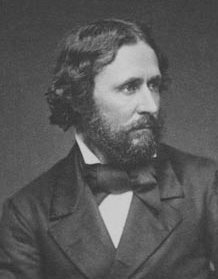
THE ELECTION OF 1856
Fremont v. Buchanan: A Critical Election in a Critical Year

The 1856 United States presidential election reflected the bitter divisions in the country over the issue of slavery. Because of the unpopularity of the Civil War in Kansas, the Democratic Party rejected incumbent President Franklin Pierce and nominated James Buchanan (right), who had been out of the country as an ambassador during much of the furor over the Kansas-Nebraska issue and therefore had no record of comments on those events. The Republican Party, which had arisen out of the ashes of the Whig party, which had split over differences between its northern and southern components, nominated John C. Frémont, known as The Pathfinder because of his explorations over the Rocky Mountains and into California. His motto was “Free soil, free labor, free men, Fremont.” The American party, known as the Know Nothings because of their refusal to answer questions about their goals, nominated Millard Fillmore, who claim to be a compromise candidate.
The Democrats supported popular sovereignty as a way of deciding on the status of slavery in the new states. Although Frémont did not call for abolition of slavery, he opposed the expansion into the territories. Buchanan warned that a Republican victory might lead to a civil war, which in fact happened in the 1860 election. For a fledgling party in their first national election, the Republicans did quite well, getting 33% of the vote and 114 electoral votes to Buchanan’s 45% and 174 electoral votes, although Frémont got very few votes in the South. Fillmore got 21% of the popular vote but only 8 electoral votes.
As an ardent Democrat, Buchanan had been favorable toward the south, what is the crisis over slavery grew sharper, he became more of a Unionist. But because he did little to address the divisions that were becoming extremely bitter, he is generally judged to be one of the worst American presidents. The nation was disintegrating around him, and he did little to try to stop it. When Lincoln was elected in 1860 and the southern states began succeeding, he did nothing, arguing that it was now Lincoln's problem, even though he would not be inaugurated until March.